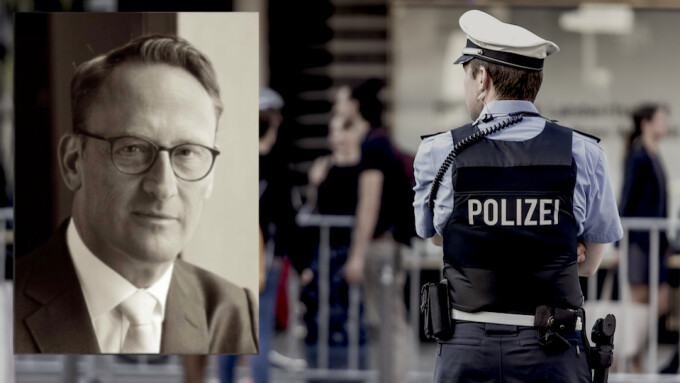BERLIN — German police have been targeting and intimidating specific Twitter users who post or retweet explicit material, in an attempt to move forward local bureaucrat Tobias Schmid’s campaign to purge all open platforms of adult content.
Germany’s leading news magazine, Der Spiegel, today devoted an entire feature to the authorities’ campaign to deter users from sharing sexual content, highlighting threats of legal action reported recently by individual users and Wired magazine.
NetzPolitik's Sebastian Meineck has been covering Schmid’s meticulous, obsessive attempts to ban all sexual content from open platforms in Germany and Europe. In an in-depth report last week, Meineck wrote that authorities had already taken down some 150 Twitter accounts for “distribution of pornography,” over tweets and retweets. He also identified a ramping-up since December, with government media authorities using the police to confront and threaten adult performers, creators and other sex workers over explicit videos and images they tweeted or promoted.
This recent outgrowth of Schmid’s campaign is one of the most prominent examples of efforts by anti-porn crusaders around the world to censor sexual expression on open platforms such as Twitter, Reddit, Discord and Telegram.
Censorship and Arbitrary Enforcement
Paulita Pappel, German porn producer and spokeswoman for the Free Speech Coalition Europe, told NetzPolitik that the police intimidation tactics constituted outright censorship.
“We are treated like criminals,” she said.
The authorities are leaning on their discretionary enforcement of Germany’s censorship clause, Penal Code Section 184, which states, “Anyone who makes available pornographic content in a place that can be viewed by persons under the age of eighteen shall be punished with imprisonment for not more than one year or a fine.”
Germany and Europe have no legal tradition of free speech protection akin to the U.S. First Amendment.
As XBIZ has been reporting, this current censorship strategy was directly prompted by Tobias Schmid, director of the State Media Authority of North Rhine-Westphalia. An obscure conservative politician who has been described as having “a fetish for order,” Schmid has been waging a one-man war on porn.
Schmid’s efforts have so far resulted in the creation of KIVI surveillance software, which he has been attempting to expand to all of Europe. KIVI automatically scans online content to determine which images are not compliant with the law. The Brandenburg-Berlin Media Authority, which handled the 150 Twitter cases made public since December, told NetzPolitik that those cases were not handled by KIVI but by human bureaucrats.
One of Schmid’s reps at the North Rhine-Westphalia Media Authority told Wired last month, “The distribution of pornography on the internet is only permitted in closed user groups with prior age verification. Since this is not the case on Twitter, the distribution of pornography via Twitter in its current form is not permitted in Germany.”
Anneke Plass, the communications director and spokesperson for the Media Authority of Berlin and Brandenburg, told Wired that in December, that bureau reported 32 accounts to the public prosecutor’s office for sharing pornography, followed by another 104 cases in March.
According to Plass, “providers” — her term for creators — of adult content “are responsible for making sure that children and young people cannot access the content.”
Providers who do not meet these requirements, Plass added, are punishable by a fine or up to one year in prison.”
“These actions create an atmosphere of fear and politically and financially strangle the industry,” Paulita Pappel told NetzPolitik. The publication noted that people in other countries have been surprised by these developments, since Germany is considered liberal and sex work is legal there under certain conditions.
German Bureaucrats Fighting 'Bizarre Sexual Practices'
The definitions used by the German authorities — for example those differentiating “eroticism,” which is protected as free speech, from “pornography,” which is subject to censorship — can be nebulous and arbitrary.
NetzPolitik quoted literature from the Commission for the Protection of Young Persons in the Media (KJM), an organ of the German media supervisory authority. The document references undefined “problematic behavior” by minors, and singles out for criminal action what it deems “aggressive sexual acts, bizarre sexual practices, use of aids [devices] and group sex.”
“What exactly is meant by ‘bizarre’ is not stated there,” writes NetzPolitik’s Meineck. “Not even which ‘aids’ are supposedly taboo.” This creates the peculiar situation in the country where minors may legally be allowed to buy sex toys but not to see how they are used.
Queried about these contradictions, one government official told NetzPolitik, “The difference between eroticism and pornography is always checked on a case-by-case basis.”
Sex worker and advocate Fabienne Freymadl criticized the KJM document’s negative references to “promiscuity and prostitution,” telling NetzPolitik that the standards used by authorities are “vague, opaque and difficult to understand, and sex and sex work hostile.”
“It’s time for us to enter the 21st century,” Freymadl added. “Neither an active sex life with several changing partners nor the practice of sex work are in any way morally reprehensible.”
Main Image: Tobias Schmid, director of the State Media Authority of North Rhine-Westphalia








